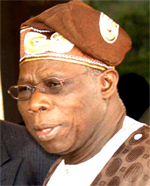Date Published: 06/15/11
Corruption: Obasanjo accuses Successors of Inconsistencies
Says: They lack the will to fight corruption
 |
Olusegun Obasanjo |
Former President Olusegun Obasanjo has criticized the inconsistencies and slow pace in the fight against corruption by his successors, saying they have shown traits of lacking in the will to fight the social malaise.
Chief Obasanjo who was succeeded by late President Umaru Musa Yar'Adua and later President Goodluck Jonathan said in a debate organised by the Club de Madrid, an independent non-profit organisation composed of 80 democratic former presidents and prime ministers from 56 different countries on “Meeting Sustainable Societies and Social Justice,” that his successors have not been persistent and consistent in the fight aganst corruption and have allowed politicians to overwhelm them.
“If you are going to fight corruption, it is not a one night or one day war. You have to be consistent and persistent with it. I haven’t seen that will of persistency and consistency in Nigeria, because the people that are involved in corruption are strongly entrenched and unless you are ready to confront them at the point of even giving your life for it, then you will give in and when you give in, that is the end of it,” Obasanjo told the panel.
Other panellists in the debate were former president of Ecuador, Mr Osvaldo Hurtado; ex-President John Kufuor of Ghana; ex-Yemeni Prime Minister, Mr Abdul Karim Al Eryani and former Prime Minister of the Netherlands, Mr Wim Kok.
Obasanjo was asked by the moderator of the debate, Ritula Shah of the British Broadcasting Corporation (BBC) if there was a political will to fight corruption in Nigeria.
The former president traced the emergence of corruption and underdevelopment in Nigeria to the discovery of oil, saying that rather than being a boom, oil has become a doom for Nigeria.
He said: “We didn’t see beyond the oil. That was one of the misfortunes of Nigeria or regrets of Nigeria but more importantly, corruption came in.
“Corruption that came in came in initially with politics at independence, when our politicians gave a contract to you, [they demand] 10 per cent. They thought that, that was the way to make money for their party.
“Ten per cent of that contract was taken to develop the party, for the party fund and all that and then, of course, it went beyond 10 per cent to 20, to 25 and, at times, it grew so large that in fact, when you were given a job, you wouldn’t just care to do it. You would share the money or whatever they called it.
“That was very bad. So when I became president of Nigeria, the first thing I did after my election was to establish an independent body to fight corruption. That body was so effective, in fact two bodies; one was a commission against financial crimes and they were both so effective that ministers of government, the head of the police and the heads of parastatal [agencies] were put in jail.
“If you are going to fight corruption, it is not a one night or one day war; you have to be consistent and persistent with it,” he said.
On economic growth, he said: “Yes, I believe that economic growth cannot be ignored because you have to grow and it is only when you grow that you have something to share. If you are going to talk of social justice, if you are going to talk of shared society, you must have something to share.
“Economic growth in itself is not enough. For long, economic growth or indicators have been used to describe development or how much progress a particular nation is making. Now you can have growth without having even development; you can have growth without having social justice.
“We in Nigeria, for instance, because they say we are an oil economy, you would hear that we have the GDP of seven per cent and you say well, where is it reflected? And they would say yes, the oil is 14 per cent, it is 15 per cent, but what of agriculture, what of manufacturing, what of these services that really, people feel that they want to enjoy?
“I believe that we need to have a new definition or a new set of indicators to show what progress a particular country is making and it should be inclusive of economic growth as social indicators.
“For instance, in Nigeria, if you say we are growing, how much has this translated to job opportunities? How much employment has been created? If you say we are growing, how much has this affected infant mortality? If you say we are growing, how much has it affected maternal mortality? If you say we are growing, how many more children have gone into school? How many people have access to medical care?
“Unless you bring these together and it is only when you bring these together, but, to me, I will say yes, the country is growing, growing in economic terms and in terms of social justice.”
|